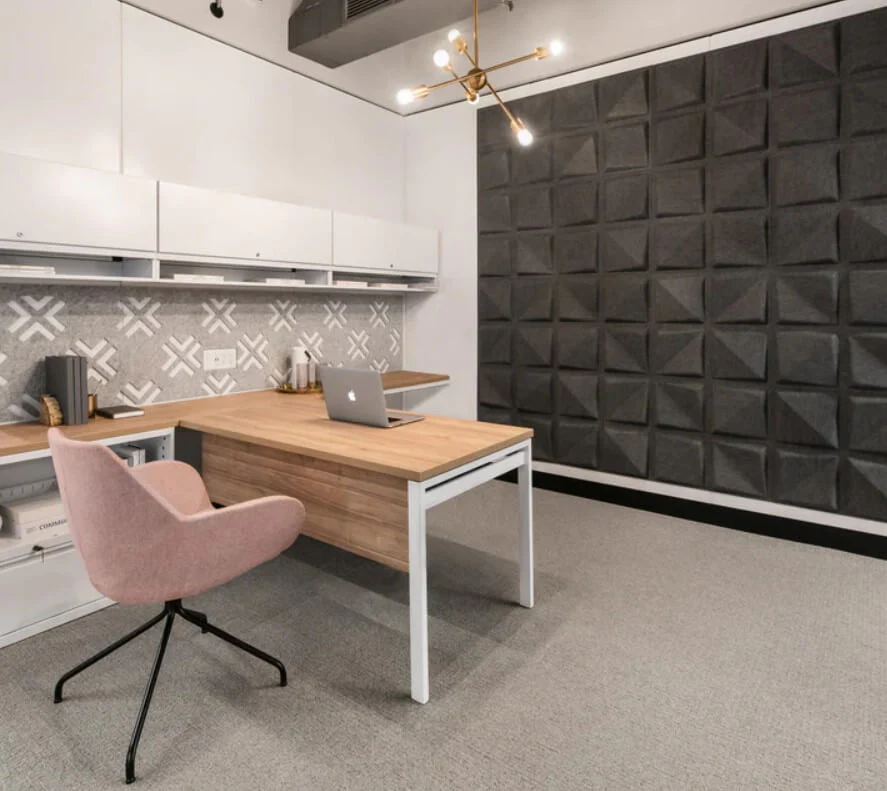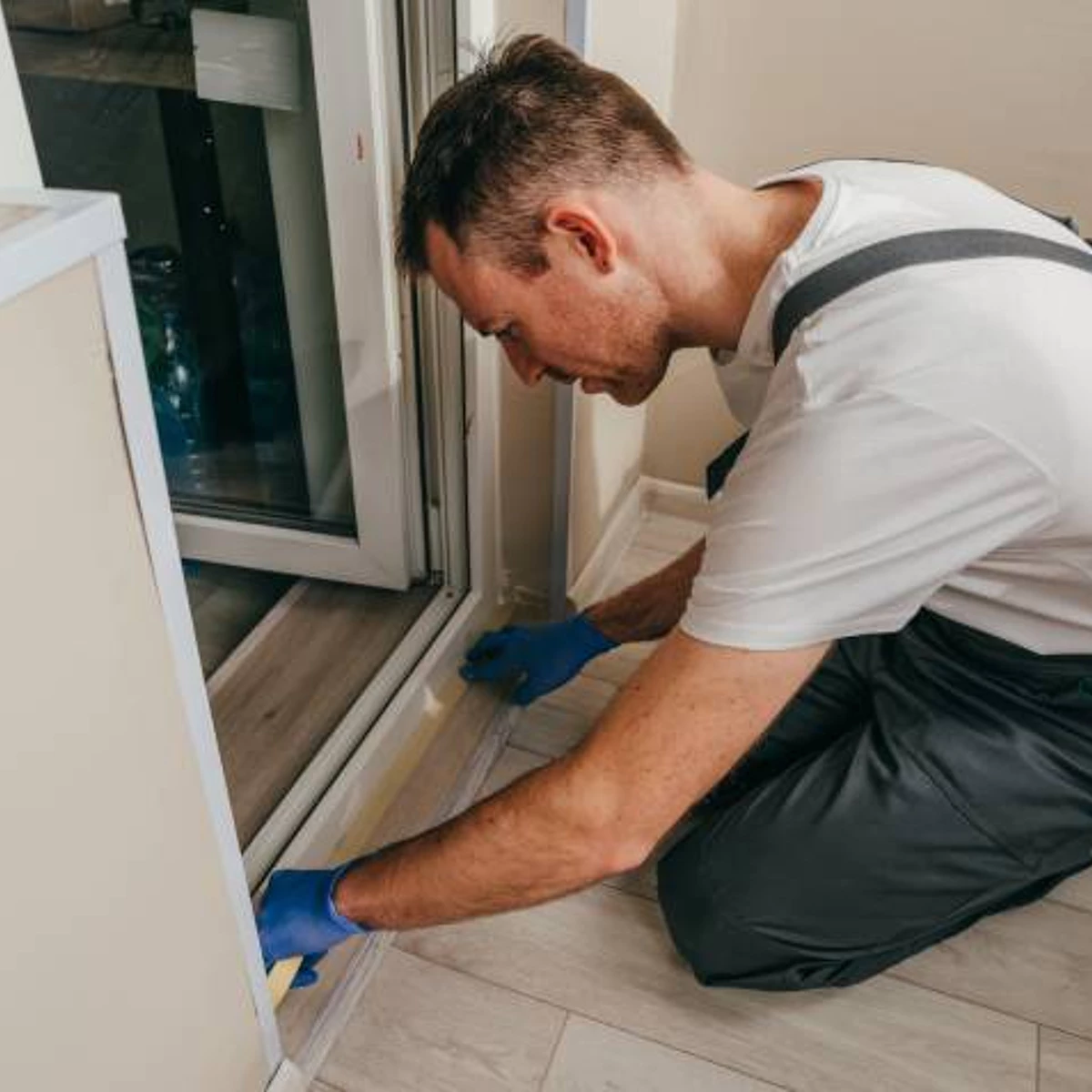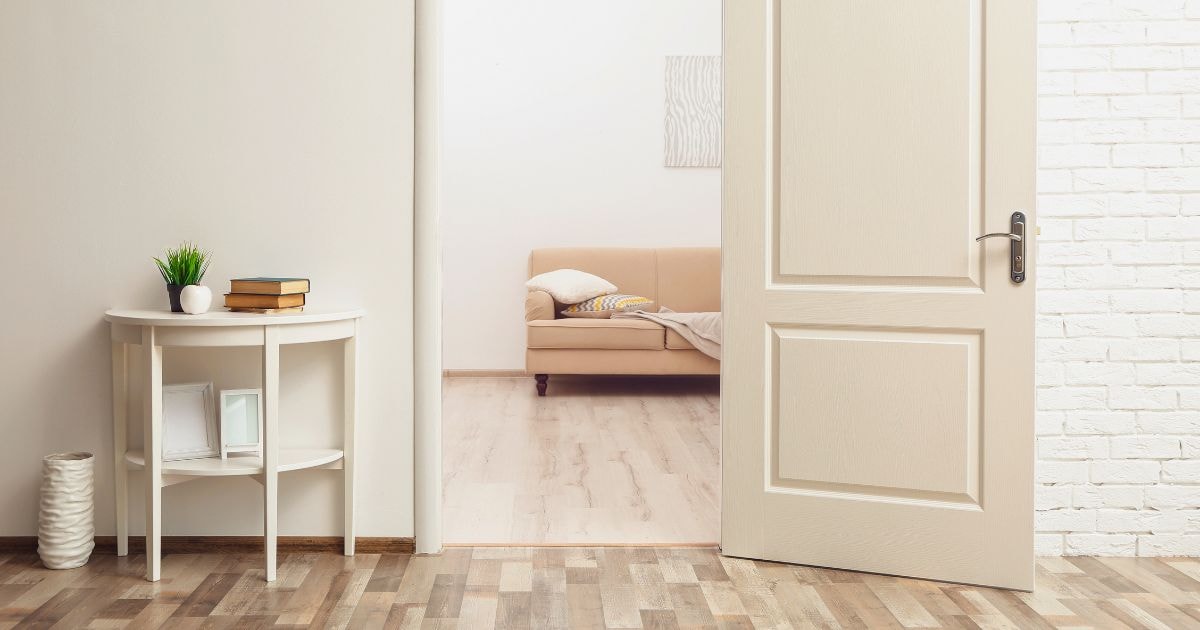My shopping cart
Your cart is currently empty.
Continue ShoppingDoors are an important element in any building, whether it's a home, office, or commercial space. They provide privacy, security and serve as a barrier against noise. However, sometimes doors can be a source of unwanted noise from the outside world or within your own space.
This can be a major disturbance and affect concentration levels. Soundproofing interior doors is a simple yet effective solution to this problem. In this guide, we will discuss 10 easy ways to soundproof interior doors to create a peaceful and quiet environment.

Soundproofing is the process of reducing or blocking sound waves from entering or exiting a space. It involves using materials and techniques to absorb, dampen or reflect sound, thereby reducing its intensity. Soundproofing is essential in areas where noise can be disruptive, such as homes, offices, studios, and classrooms.
There are two types of soundproofing: airborne and impact noise. Airborne noise refers to sounds that travel through the air, such as voices, music, and traffic. Impact noise comes from vibrations transmitted through floors and walls due to footsteps or moving furniture. Both types of noise can be reduced by soundproofing techniques.
When it comes to interior doors, soundproofing helps to keep noise from entering or leaving a room. This is especially important for bedrooms, home offices, and media rooms where peace and quiet are essential.
Soundproofing can also improve the overall acoustics of a space by reducing echoes and reverberations. It creates a more comfortable and enjoyable environment for activities such as listening to music, watching movies, or having conversations.
There are several reasons why soundproofing interior doors is necessary. One of the main reasons is to create a peaceful and quiet environment, especially in areas where noise can be disruptive.
For homeowners, soundproofing interior doors can help reduce outside noise from traffic, neighbors, or construction work. It also prevents noise from traveling between rooms, providing privacy for family members or roommates.
In offices and commercial spaces, soundproofing interior doors can increase productivity by reducing distractions and creating a better working environment. Conference rooms and private offices often require soundproofing to ensure confidential conversations remain private.
Another reason to soundproof interior doors is for energy efficiency. A well-insulated door can prevent air from leaking in and out, reducing energy costs for heating and cooling.
Lastly, soundproofing interior doors can improve the overall value of a property. Buyers are often willing to pay more for a home or office with good sound insulation. It also adds to the comfort and livability of a space, making it a desirable feature for potential tenants or buyers.
Overall, soundproofing interior doors is an effective way to increase privacy, reduce noise disturbances, improve energy efficiency, and add value to any space. In the following sections, we will discuss 10 simple ways to achieve this.

Now you know the importance of soundproofing interior doors, let's dive into 10 simple ways to achieve it.
Installing weatherstripping is one of the most effective and economical methods to soundproof interior doors. Weatherstripping is designed to seal gaps around the door frame, preventing sound from leaking through.
This material comes in various forms, such as adhesive-backed foam, rubber, or vinyl. To install, simply measure the dimensions of your door frame and cut the weatherstripping to size.
Clean the surface where you will apply it, ensuring it is free of dust and debris, then peel off the backing and press the weatherstripping firmly into place. Not only does this reduce sound transmission, but it also helps with insulation, making your space quieter and more energy-efficient.
Draft stoppers, also known as door snakes or draft dodgers, are long cushion-like tubes that are placed at the bottom of a door to prevent drafts from entering. They can also be effective in reducing noise from under the door.
You can purchase draft stoppers or make your own using materials like old socks or fabric scraps filled with sand or rice. Simply place them against the bottom of your interior doors to block out unwanted noise and drafts.
Using both weatherstripping and draft stoppers together can provide even better soundproofing results. And the best part is, they are both affordable and easy to install.
Hollow-core doors are lightweight and tend to transmit sound more easily than solid wood or metal doors. If your interior doors are hollow, consider replacing them with heavy, solid alternatives.
Solid wood or metal doors offer better noise insulation due to their denser materials. They also provide added security and durability. However, this option may be more expensive and require professional installation.
If you can't replace the door itself, another option is to add mass-loaded vinyl to the surface of the door for increased soundproofing. This material is designed specifically for blocking out noise and can be easily attached using adhesive.
Even small gaps around a door frame can allow sound to pass through. To fill these gaps, you can use acoustic caulk or foam sealant. These materials are specifically designed for soundproofing and are more effective than regular caulk or sealant.
Acoustic caulk is a flexible, non-hardening material that remains pliable, making it ideal for filling small gaps. Foam sealant, on the other hand, expands to fill larger gaps and provides better insulation.
Before applying either of these products, make sure to clean the area thoroughly and remove any old caulking. Once applied, smooth out the surface with your finger or a putty knife for an even finish.
Another simple way to soundproof interior doors is by using soundproof curtains or blankets. These products are designed with thick, noise-blocking materials that absorb and reduce sound waves.
Soundproof curtains can be hung over the door like regular curtains, while blankets can be placed in front of the door or even attached to the surface using adhesive strips.
Not only do these options provide added privacy and reduce outside noise, but they also add a decorative touch to your space. They are also easy to install and can be easily moved or removed if needed.
A door sweep is a long strip of rubber or bristles that attaches to the bottom of a door, creating an extra barrier against sound and drafts. It is especially useful for doors that have larger gaps at the bottom.
To install a door sweep, simply measure and cut it to fit the width of your door, then screw or nail it in place. The rubber or bristles should touch the floor when the door is closed, effectively blocking out any noise from underneath.
Door sweeps are also available with automatic features, allowing them to lift off the ground as you open and close the door. This is a convenient option for high traffic areas where constantly moving the sweep may be inconvenient.
Soundproofing door kits are specifically designed to reduce noise transmission through the door. These kits typically include materials such as foam tape, seals, and a door sweep, providing an all-in-one solution for soundproofing.
To install a soundproofing door kit, first remove any existing weatherstripping or sealant from your door. Then follow the instructions provided with the kit to apply the various materials in the designated areas.
These kits are relatively easy to use and provide effective soundproofing results. They can be especially useful for those who want a simple and straightforward solution for their interior doors.
Sound-absorbing panels or acoustic panels are designed to absorb sound waves and reduce noise. They can be hung on the door using adhesive strips or hooks, providing a decorative and functional solution for soundproofing.
Acoustic panels come in various sizes, shapes, and designs, making it easy to find one that fits your interior decor. They are also available in different materials such as fabric-wrapped foam or perforated wood for a more natural look.
In addition to hanging them on the door, you can also place acoustic panels strategically around the room to further enhance their effectiveness. This is especially helpful if your interior door leads to a larger open space where sound travels easily.
So these are some effective ways to soundproof your interior doors. By implementing one or more of these methods, you can create a quieter and more peaceful environment in your home. Remember, combining multiple techniques can provide even better results, so don't be afraid to experiment and find the best solution for your specific needs.
Absolutely! A soundproof door can make a significant difference in reducing noise levels and creating a more peaceful living environment. Interior doors are often the weakest link when it comes to sound insulation, but by implementing the methods mentioned above, you can significantly improve their performance.
Replacing hollow-core doors with solid wood or metal doors, filling gaps with acoustic caulk or foam sealant, and using sound-absorbing materials such as curtains or blankets all contribute to better soundproofing results. Additionally, installing a door sweep and utilizing a soundproofing door kit can provide even further improvements.
The level of difference may vary depending on the specific techniques used and the type of noise you are trying to block out. However, in general, implementing soundproofing measures for interior doors can make a noticeable impact on reducing noise levels and creating a more peaceful living space.

Not necessarily. While soundproofing is often associated with reducing outside noise, it can also be beneficial for creating a quieter environment within your own home.
For example, if you have a home office or a nursery that requires minimal distractions, implementing soundproofing techniques on interior doors can help block out household noise and create a more peaceful atmosphere.
Additionally, soundproofing measures can also improve the overall insulation of your home, helping to reduce energy costs and maintain comfortable temperatures. This can be especially helpful during extreme weather conditions.
Even if you live in a relatively quiet neighborhood or apartment building, soundproofing interior doors can still provide added privacy and create a more soundproof barrier between rooms. So whether you're looking to block out external noise or create a quieter interior space, soundproofing is a useful technique for any environment.
Yes, soundproofing techniques can be applied to almost any type of door. The effectiveness may vary depending on the material and construction of the door, but there are solutions available for both solid and hollow-core doors.
For example, if you have a hollow-core door, replacing it with a solid wood or metal door would provide better sound insulation. However, if replacing the door is not an option, filling gaps and adding sound-absorbing materials can still greatly improve its performance.
On the other hand, if you have a solid wood or metal door that is already relatively soundproof, implementing additional measures such as acoustic panels or using a door sweep can provide further enhancements.
It's important to evaluate your specific needs and the construction of your doors before choosing which soundproofing techniques to use. With a wide range of solutions available, you can find effective ways to reduce noise levels and create a more peaceful living environment for any type of door.
If you're looking to soundproof your interior doors, My City Doors offers a variety of solutions to fit your specific needs. Our collection includes high-quality solid wood and metal doors as well as soundproofing kits and accessories.
Our range of door options allows you to choose the best fit for your interior decor while also providing effective sound insulation. We also offer expert guidance and support in selecting and installing the right soundproofing measures for your doors.
At My City Doors, we are dedicated to providing top-notch products and services to help create a quieter and more comfortable living environment for our customers. Visit our website or stop by one of our locations to explore our selection and find the perfect solution for your interior door needs.
Installing a solid core door helps with soundproofing because solid core doors are denser and more effective at blocking sound than a typical hollow core door. The added mass of a solid core door prevents noise from easily passing through, making it a great option for bedroom door soundproofing.
Yes, exterior doors can be used as soundproof doors for interior spaces because they are typically designed to block outdoor noise. An exterior door often has a solid core and weatherstripping, both of which contribute to better soundproofing compared to a typical hollow core door.
Solid core doors offer significant advantages over typical hollow core doors for soundproofing due to their density and weight. Solid core doors effectively block sound transmission, making them ideal for creating quieter spaces like bedrooms or home offices.
To improve the soundproofing of a bedroom door without replacing it, you can add weatherstripping around the edges, install a door sweep at the bottom, or hang heavy curtains over the door. While these methods won't be as effective as installing solid core doors, they can help reduce noise passing through a typical hollow core door.
Soundproofing your interior doors is not only a practical solution for reducing noise levels but also a way to enhance the overall atmosphere of your home. By using various techniques and materials, you can effectively block out external noise, create more privacy between rooms, and improve energy efficiency.
At My City Doors, we understand the importance of soundproofing in creating a comfortable living space. That's why we offer a wide range of high-quality door options and soundproofing kits to fit your specific needs.